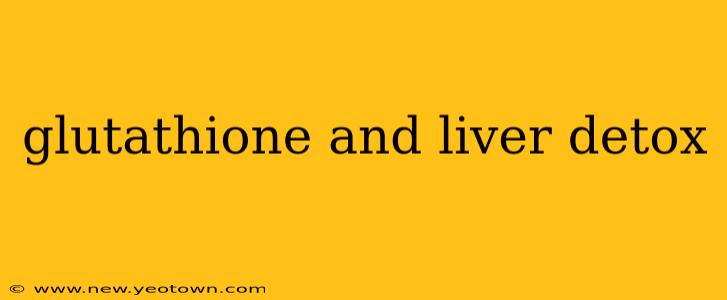The liver, our body's tireless workhorse, silently filters toxins, metabolizes drugs, and produces essential substances. But this vital organ can become overwhelmed, leading to a sluggish liver and a cascade of health problems. Enter glutathione, a powerful antioxidant often touted for its role in liver detoxification. But how does this fascinating molecule actually work, and what's the science behind the hype? Let's unravel the story.
Imagine your liver as a bustling city, constantly processing waste. Toxins, like pollutants and byproducts of metabolism, flood in, and the liver's cells, the diligent sanitation workers, work tirelessly to neutralize and eliminate them. Glutathione, a small protein composed of three amino acids (glutamic acid, cysteine, and glycine), acts as the city's sanitation supervisor. It doesn't directly remove the garbage itself, but it orchestrates the process, ensuring the waste removal system runs efficiently.
How Glutathione Supports Liver Detoxification
Glutathione's primary role in liver detoxification is its involvement in two major detoxification pathways:
-
Phase I detoxification: This phase involves modifying toxins, making them more water-soluble for easier excretion. Glutathione directly participates in this process, conjugating (binding to) toxins, thus neutralizing their harmful effects. Think of it as tagging the trash for easier collection.
-
Phase II detoxification: This phase involves further modification and elimination of the modified toxins. Glutathione is pivotal here, acting as a crucial cofactor (a substance that helps enzymes work) for several key enzymes involved in this phase. It's like ensuring the sanitation trucks have the fuel to efficiently transport the tagged waste.
What are the benefits of Glutathione for Liver Health?
Glutathione's impact on liver health is multifaceted:
-
Protection against oxidative stress: Glutathione is a potent antioxidant, neutralizing harmful free radicals that can damage liver cells. Free radicals are unstable molecules that can cause cellular damage leading to inflammation and disease. This protection is crucial, as the liver is constantly exposed to toxins.
-
Enhanced liver enzyme function: By supporting Phase I and Phase II detoxification pathways, glutathione helps maintain optimal liver enzyme activity, allowing the liver to efficiently process and eliminate toxins.
-
Reduced inflammation: Glutathione helps reduce liver inflammation, a common factor in various liver diseases. Inflammation can impair liver function and contribute to the progression of liver damage.
-
Support for liver regeneration: Some research suggests glutathione may support liver regeneration, the liver’s ability to repair itself after injury.
Does Glutathione Help with Liver Damage?
While glutathione offers significant support for liver health, it's crucial to understand that it's not a miracle cure for existing liver damage. For individuals with pre-existing liver conditions, such as cirrhosis or hepatitis, glutathione supplementation should be considered as part of a holistic treatment plan under the guidance of a healthcare professional. It can be a supportive measure, but not a replacement for medical intervention.
What foods are high in glutathione?
While your body naturally produces glutathione, dietary intake plays a role. Foods rich in the amino acids that make up glutathione can enhance its production. These include:
- Avocados: Rich in cysteine and glutathione precursors.
- Broccoli: A cruciferous vegetable packed with antioxidants.
- Spinach: Contains high levels of glutathione precursors.
- Asparagus: Another excellent source of glutathione precursors.
Can you take too much glutathione?
Excessive supplementation can have potential side effects, although relatively rare. It is advisable to consult a healthcare professional before starting any glutathione supplementation.
How can I improve my liver health naturally?
Besides incorporating glutathione-rich foods, other lifestyle choices contribute to optimal liver health:
- Maintain a healthy weight: Obesity stresses the liver.
- Regular exercise: Promotes overall health and liver function.
- Limit alcohol consumption: Alcohol is a major liver toxin.
- Eat a balanced diet: Prioritize whole foods and minimize processed foods.
In conclusion, glutathione plays a vital role in liver detoxification, acting as a crucial support system for this hardworking organ. While it offers significant benefits for liver health, it's essential to remember that a holistic approach – including a healthy lifestyle, balanced diet, and, when necessary, medical intervention – is key to maintaining optimal liver function. Always consult a healthcare professional before starting any new supplements, especially if you have existing health conditions.

